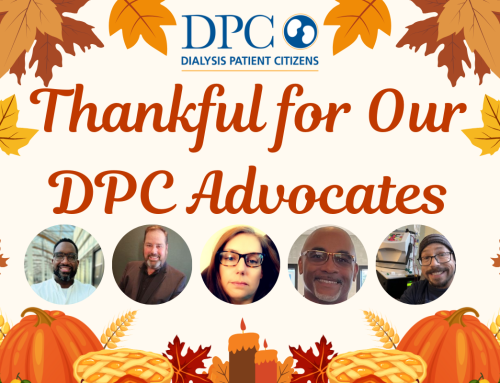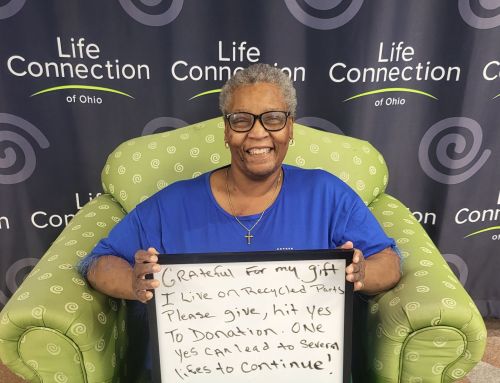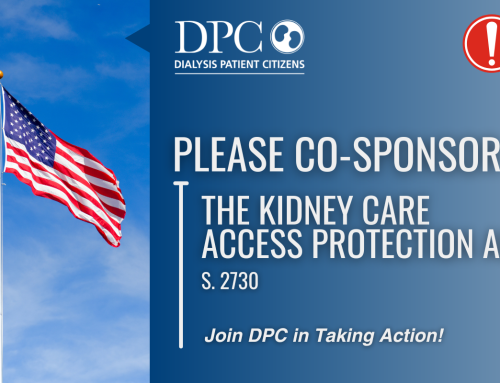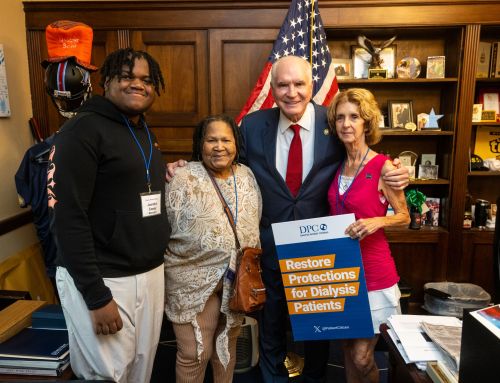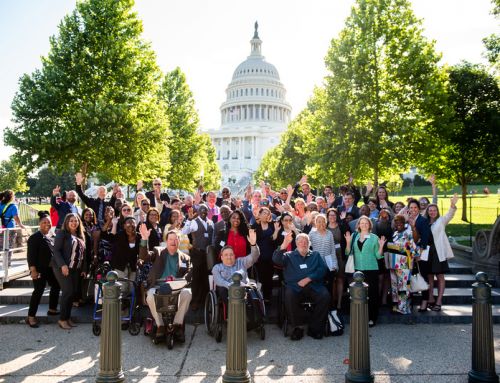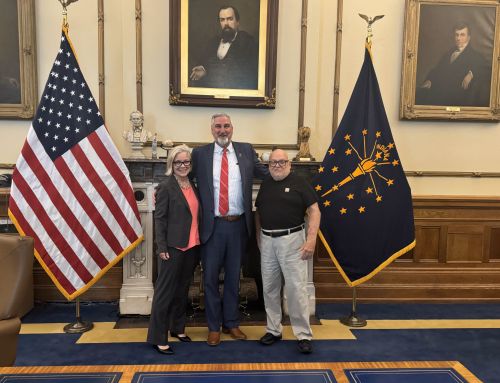June 11, 2024
The Honorable Jonathan Blum
Principal Deputy Administrator
Centers for Medicare & Medicaid Services
200 Independence Avenue, SW
Washington, DC 20515
Re: New drugs in the ESRD PPS
Dear Principal Deputy Administrator Blum:
In our comments on the 2024 ESRD payment rule, we expressed our concerns about how patients experienced the rollout of Korsuva, the drug that treats ESRD-related pruritis. We noted that the prescribing behavior of nephrologists has amounted to, in effect, a de facto embargo of the medication. Empirical research has found a prevalence of moderate to severe pruritis among dialysis patients of 33 percent, but Korsuva has been dispensed to fewer than one percent of patients. Last year, the Agency baked the artificially low take-up during the TDAPA period into the cake, adding a tiny amount to the bundle and locking in a depressed rate of utilization in perpetuity.
As explained below, we believe that the Agency’s handling of this matter has caused a debacle. We are asking the agency to (1) perform an after-action analysis of the circumstances surrounding Korsuva coverage, payment, and clinicians’ reactions, and impact on patients; and report the findings to the Administrator, to Congress, and to the public; (2) undertake a negotiated rulemaking process with stakeholders that ensures that Korsuva is dispensed in the manner that it would be dispensed in the absence of payment bundling; and (3) develop policy going forward that will guarantee the development and uptake of new technologies in a manner congruent with those not subject to Medicare bundling.
- Payment bundling raises serious legal and policy concerns that the Agency is ignoring.
Section 1395 of the Medicare Act prohibits federal interference or control over the practice of medicine. This should be interpreted in the context of the 1965-era health care system. At that time, when pure fee-for-service prevailed, the physician ordered treatments which were then covered by insurance. The physician’s role was to advocate for the patient, not for cost-containment. When the Agency accepts or encourages medical outcomes that have not developed organically, but ensued solely because of Medicare payment idiosyncrasies, it is interfering with the practice of medicine within the meaning of 1395.
In order to mitigate the excesses of allowing dialysis facilities to separately bill for items, Congress enacted the ESRD PPS. But bundled payments come with their own perverse incentives. In bluntly changing financial incentives to discourage provision of ancillary items, bundles don’t necessarily distinguish between wasteful or dangerous items and items that are necessary for patients. Medicare beneficiaries rely on CMS to mitigate those perverse effects.
Unfortunately, the situation that dialysis patients are experiencing is by no means unique. As we documented in a recent commentary for the American Journal of Managed Care, rigid prospective payment systems have caused stinting in the provision of physical therapy and shortages of some generic drugs used in hospitals. According to evaluation reports commissioned by CMS, CMMI episode-based bundles have reduced provision of post-acute care to the point that around a tenth of patients are experiencing poorer outcomes. These differential patterns of practice are distortions caused by Medicare policy and in our view, violate both the spirit and letter of Section 1395.
The typical prescribing scenario in Medicare is that doctors have no disincentive to prescribe and may be incentivized to overprescribe. When prescriptions are paid for by a Part D PDP, PDPs can use formularies or prior authorization to restrict expensive drugs. In such cases, doctors act as advocates for their patients in obtaining the drug. In the ESRD sphere, however, nephrologists are frequently in joint ventures with dialysis clinics and incentivized to keep utilization of bundled drugs low. It appears that nephrologists are not acting as advocates for patients with pruritis.
We believe that nephrologists were reluctant to prescribe the drug due to fear of consequences of taking it away from patients when the payment cliff arose at the end of the TDAPA period.
Under common-law doctrines of professional liability, providers are obligated to deliver the level of care and treatment recognized as appropriate by reasonably prudent similar health care providers. If, during the TDAPA period, treatment of pruritis by Korsuva had become widespread and, in effect, the standard of care, physicians and facilities would have become liable if they no longer provided it at their own expense.
The time-limited TDAPA period therefore invites and facilitates providers’ manipulation of the standard of care to avoid liability—essentially a federally promulgated program of do-it-yourself tort reform that prevents the organic dissemination or implementation of best practices in care. That agency rulemaking can necessitate and encourage collusion to retard evolution of the standard of care is an egregious violation of section 1395.
- Pruritis is a serious quality-of-life problem that continues to go unaddressed.
“Pruritus is very common among patients who receive hemodialysis. Uremic pruritus is attributed to CKD and end-stage renal disease in the absence of primary dermatologic findings and other pruritus-inducing disorders such as eczema. With a prevalence of 20%–50%, pruritus is one of the most common contributing factors to discomfort in CKD. The major causes of pruritus in CKD are cytokines, hyperparathyroidism, hyperkalemia, hyperphosphatemia, uremia, anemia, and waste product accumulation in the skin. Pruritus can lead to erosion at the vascular access site and loss of the hemodialysis session.”[1]
We solicited reports from patients about their pruritis and their conversations with clinicians.
Aurora Hernandez described her pruritis as “severe uncontrollable itching and excessive dryness of skin. Very dry scalp with severe dandruff problem and itching. It itches all over my arms, legs, feet, back, chest area. So bad I carry a back scratcher in my purse. Break my skin and redness all over. Imagine trying to scratch your back and can’t do for 4 hours during dialysis treatment with one arm and can’t move because you’re hooked up with the other. It is total torture. Having episodes more frequently now. Tried everything over the counter but nothing works. Please help. No one has ever mentioned the Korsuva. Not the clinicians nor the Doctor.”
A patient from Tampa, Florida: “Recently my phosphorus levels were running high, and I was experiencing constant itching and a reddish rash on my calves. We have not had any conversations. I was previously not aware there even was something for this condition.”
From Jennifer McClung, an ESRD patient who received a transplant several years ago: “When I was on dialysis there was a time my skin would not stop itching. The doctor could not explain why my skin was itching so badly. I was itching so much that I was tearing my skin up and still have scars from it to this day! My doctor referred to a dermatologist and he thought I was actually depressed and was cutting myself. He put me on medication for the ‘depression’ and would have had me come in for UV light treatments. If this medication [Korsuva] was available to me, it could have saved me from the scars I have.” Ms. McClung consented to sharing a photograph of the scars on her arms, which is appended to this letter.
A patient from Milwaukee, Wisconsin: “I have terrible itching. I itch until I bleed unfortunately. All my nephrologist told me was to cut my fingernails short because fingernails breed bacteria. I just grab the cortisone cream which is not that effective.”
Michael McCranie: “My experience with itching is that it’s a result of either too much phosphorus and/or dry skin associated with ESRD and dialysis. The best solution I’ve found, told to me by my dermatologist, is to use CeraVe Itch relief cream. I use on my legs and feet pretty much my entire body during the winter.”
A patient from Lansing, Mich: “I have pruritis on and off since being on dialysis. It is horrible. I wouldn’t wish it upon anyone. It feels like an itch you just can’t scratch. I would itch and itch and itch and dig into my skin but still continue to itch! I was prescribed hydroxizine for it and it doesn’t seem to help at all. They just told me hydroxizine was the only medicine available, that or Benadryl.”
One patient, Maria Robinson, reports that she was given Korsuva during clinical trials and that it relieved her itching. But later, after the medication was approved by the FDA, she experienced an acute pruritis episode and asked her care team for the drug. Even though the drug was supposedly being paid for by CMS, her request was denied. This topsy-turvy outcome would make even Lewis Carroll blush.
We listened to the CMS Administrator’s National Stakeholder call last month, during which senior officials trumpeted expanded coverage of cancer drugs and the extension of Medicaid coverage of hepatitis drugs to persons with substance use disorder. It is hard to describe the distress and dismay that comes from feeling we are unlikely to ever hear these officials brag about extending coverage to, say, a wearable artificial kidney, since the Agency disfavors spending on bundled items. It appears that a mindset has taken hold that the availability of new technology covered by an old bundle is a nuisance to be managed rather than an advance to be welcomed.
We think it fundamentally unfair that dialysis patients can miss out on opportunities for improved care because they are subject to a payment bundle and global budget. Since Medicare Parts B and D are not subject to payment bundling or global budgets, patients with other chronic diseases have access to new treatments regardless of whether those treatments even improve outcomes.
- The Agency should revisit and reverse this fiasco with a call for negotiated rulemaking.
A tremendous opportunity to improve kidney patients’ quality of life was squandered due to rigid and unwarranted abidance to bundling principles. There are two problems facing patients here: a system that incentivizes neither the development or uptake of new therapies; and the possibility of stinting by providers who receive a fixed payment. The agency needs to acknowledge that there was a bad outcome, caused by the agency itself, set things right, and put procedures and protections in place that ensure it will not be repeated with other new treatments in the pipeline.
CMS’ traditional rulemaking process that hurls thunderbolts from on high and leaves providers to scramble and change their practices to comply is uniquely unsuitable to a situation like the approval of Korsuva, which involves many moving parts in addition to the unfavorable financial incentive manifested in a bundle. At the very least, multiple iterations could be necessary to achieve the optimal conditions for uptake of the drug. A better way would be to bring stakeholders together at the beginning, to reach consensus on a preferred outcome and then tailor the payment policy interventions to achieve that outcome.
The Negotiated Rulemaking Act permits and encourages negotiated rulemaking when
- a limited number of interests that will be significantly affected by the rule can be identified,
- a committee with balanced representation would be able to be convened,
- there is a reasonable likelihood that a committee would be able to reach a consensus on the proposed rule within a fixed period of time,
- using negotiated rulemaking would not unreasonably delay the issuance of a proposed rule, and
- the agency can commit to using the consensus of the committee as the proposed rule.
The Agency must recognize that the policy of spreading the payment for expensive drugs used by fewer than all of ESRD patients across all patients is not tenable. As we have stated before, we believe the safest approach to protect patients is to return such drugs to being separately billable in order to protect patients. But we realize there is reluctance to “unbundle” items. Convening a negotiated rulemaking process may help stakeholders and the Agency develop some means of getting the drug to patients while also guaranteeing that dialysis providers are not left holding the bag financially. The agency and providers, through dialog, flexibility, and creativity, should be able to reach an accommodation acceptable to all, but most importantly, to the patients suffering from pruritis.
Public announcements indicate that Korsuva’s manufacturer has abandoned its clinical program looking at oral difelikefalin in CKD-aP in non-dialysis dependent patients and laid off nearly half of its workforce in January. We fear that the Korsuva fiasco is already having a domino effect on the development of new treatments for kidney patients. We ask that the agency work expeditiously to reverse this damaging chain of events.
Thank you for your consideration of our comments and concerns. If you have any questions or would like additional information, please do not hesitate to contact me or our Vice President of Public Policy Jackson Williams (at 202-768-4506 or jwilliams@dialysispatients.org).
Respectfully submitted,
Hrant Jamgochian, J.D., LL.M.
Chief Executive Officer


